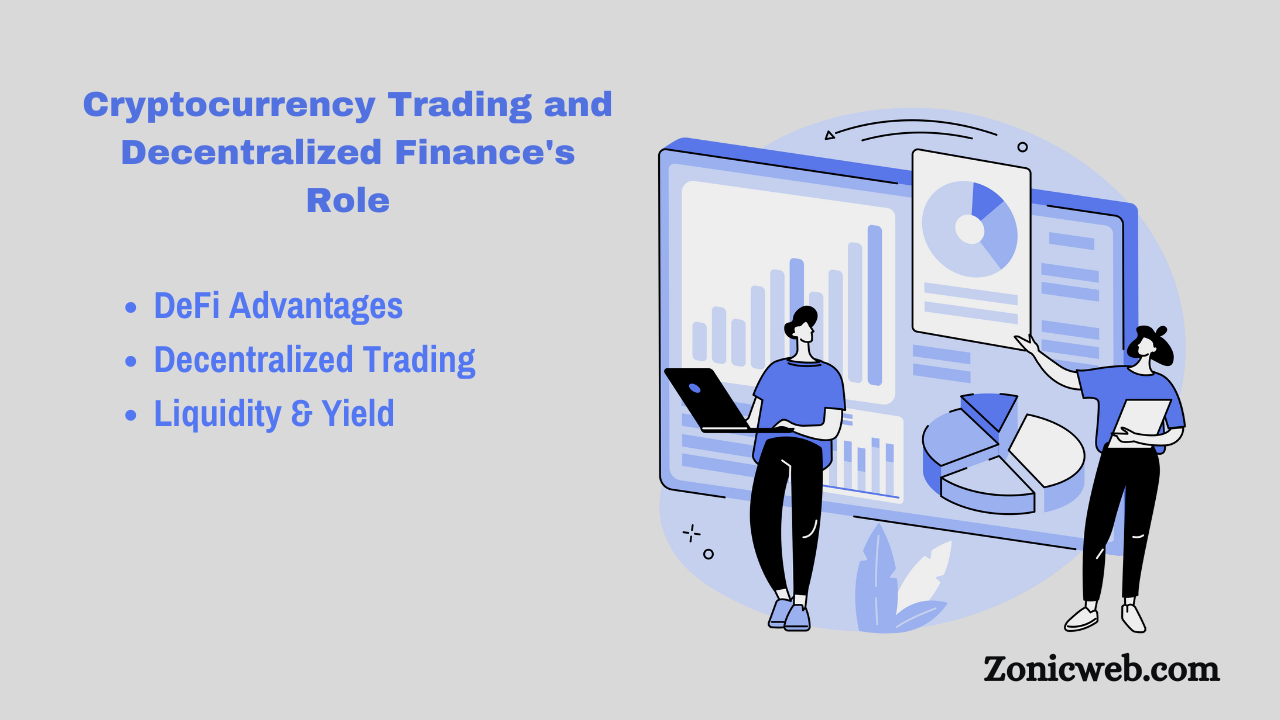By providing a brand-new financial system based on blockchain technology and operating without traditional intermediaries like banks or brokers, decentralized finance (DeFi) transforms crypto trading. Through smart contracts, DeFi applications make peer-to-peer financial services possible. This gives traders access to a variety of tools for lending, borrowing, and exchanging assets. Financial markets are made more accessible, secure, and transparent by these decentralized platforms, making them more inclusive and effective for all users.
The elimination of intermediaries is one of DeFi’s primary contributions to cryptocurrency trading. Transactions are facilitated by centralized entities in traditional finance, which frequently results in fees and delays. By employing smart contracts that execute transactions automatically in response to predefined conditions, DeFi eliminates the need for these intermediaries. This makes it difficult for traders to trust one another and allows them to talk to each other directly, which lowers costs and speeds up transactions. Traders can take full control of their assets at all times by using DeFi, which improves security and reduces the risks of centralized exchanges.
Another area in which DeFi has had a significant impact on crypto trading is liquidity. Smaller traders may be denied access to traditional markets because large institutions or market makers frequently provide liquidity. Users can deposit their crypto assets into decentralized platforms through DeFi’s liquidity pools, where they can receive a portion of the trading fees. By providing liquidity for trading pairs, these pools ensure that transactions run more smoothly and lower the likelihood of price slippage. Traders can trade large volumes more effectively and with lower volatility using this decentralized liquidity model.
DeFi likewise empowers decentralized trades (DEXs), where clients can exchange straightforwardly from their wallets without the need to store assets into an incorporated trade. Automated market makers (AMMs) set prices using algorithms based on supply and demand to power these DEXs. By allowing users to trade directly from their wallets, this system increases security and reduces the likelihood of exchange collapse and hacking. Since traders do not need to create accounts or submit to identity verification in order to participate, DEXs also provide a higher level of privacy.
DeFi gives crypto traders access to decentralized lending and borrowing services, which is yet another significant advantage. Traders can borrow against their crypto holdings or lend their crypto assets for interest using DeFi platforms without going through traditional financial institutions. The lending and borrowing procedures on these platforms are automated by smart contracts, so there are no credit checks or approvals required. With collateralized loans, traders can take advantage of market opportunities or hedge their positions without having to sell their crypto holdings.
Another DeFi innovation that has reshaped crypto trading is yield farming, which is also known as liquidity mining. By providing liquidity to DeFi protocols, yield farming makes it possible for traders to generate passive income. Users receive tokens that can be traded or reinvested in return for staking their assets in liquidity pools. Users are encouraged to contribute to the liquidity and stability of decentralized platforms by this system, which also gives them the chance to earn returns on assets that are not being used. However, yield farming can be risky due to price volatility and impermanent loss, in which staked assets’ values fluctuate in comparison to those of holding the asset in its entirety.
Additionally, DeFi has made synthetic assets available to the crypto trading community. Blockchain technology is used to create digital representations of real-world financial instruments like stocks, commodities, and fiat currencies called synthetic assets. Users can gain exposure to traditional markets without leaving the crypto ecosystem by trading synthetic assets on DeFi platforms. Cryptocurrency users now have more options for trading, allowing them to better manage risk and diversify their portfolios.
Due to the open-source nature of blockchain technology, DeFi prioritizes transparency and security. Public ledgers contain records of all transactions, smart contracts, and platform operations, allowing users to verify the system’s integrity. Traders are able to have faith in the fairness of DeFi platforms because this lowers the risk of manipulation and fraud. However, because code flaws can lead to exploits or hacks, the reliance on smart contracts also carries potential risks. As a result, traders should carefully evaluate the platforms they use.
One of its most significant benefits is DeFi’s accessibility. People are often left out of traditional financial systems because of their wealth, location, or credit history. DeFi, on the other hand, is accessible to anyone with a crypto wallet and an internet connection. People from all over the world can now trade, lend, and invest without the need for gatekeepers thanks to this inclusivity, which has democratized access to financial services.
In conclusion, decentralized finance plays a crucial role in crypto trading by removing middlemen, increasing liquidity, making it possible for decentralized exchanges to operate, providing opportunities for lending and borrowing, making yield farming easier, and broadening access to synthetic assets. DeFi is reshaping the financial landscape and providing traders with new tools to improve their strategies and achieve financial success. It places an emphasis on accessibility, security, and transparency. However, users must approach DeFi with caution and a thorough understanding of the platforms they engage with due to the risks associated with smart contracts and market volatility.
